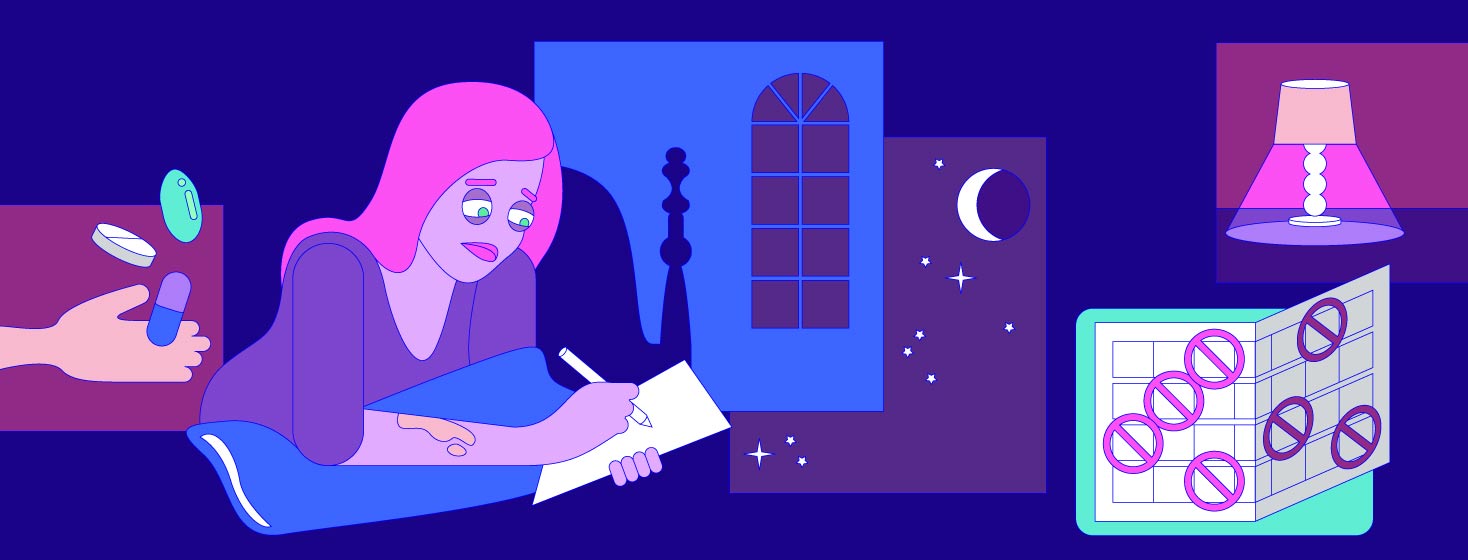Itching and Insomnia: It’s Not in Your Head
Insomnia is the most common sleep disorder—and likely the most challenging to treat. Unfortunately, people with chronic conditions like atopic dermatitis (AD) may feel as if they’re being treated like hypochondriacs when they ask about sleep problems. It’s not a good feeling to receive feedback from your healthcare provider that suggests you might just be “imagining things.” Or, in some cases, you may be sent home with a sleeping pill, even if you’re not interested in this approach. What can you do to break your cycles of sleeplessness?
What causes insomnia?
Finding the root cause of one’s sleeplessness can be tricky. Insomnia can result from:
- Using certain medications
- Consuming certain foods or drinks
- Anxiety
- Other health conditions
- Other sleep disorders
- Poor sleep hygiene
- All of the above
Track your sleep
One of the best ways to ferret out the reason why you can’t sleep is to keep a sleep diary. In it, you track a variety of potential reasons why you can’t sleep. You can use an app, which may also use actigraphy to measure your tosses and turns, but I like keeping a bedside journal. In it, track the following information nightly:
- Bedtime (that night)
- Rise time (the following morning)
- Medications taken during that day (doses and times)
- Circumstances that might lead to racing thoughts
- Physical symptoms that disrupt sleep (itching, headache, stomach problems), rated by severity
- Daytime naps (the times and lengths)
- Foods you ate throughout the day
That’s a lot of data, but from it, you might see patterns emerge. This information, by itself, won’t necessarily end insomnia, but it will help you move on to the next step: seeking medical advice for your sleeplessness.
Talk to a doctor about your sleeping habits
Start with your primary care provider, and if they won’t listen, ask for a referral to a sleep specialist. Or, talk to your dermatologist, and if they won’t listen, ask for a referral to a sleep specialist. It’s okay to ask for a referral. It’s your right to inquire about your options. A trip to the sleep clinic shouldn’t be a last resort, but an early option. A sleep medicine specialist will ask targeted questions and consider your physical history of AD.
A heads up: You may be referred to a therapist instead of, or in addition to, a sleep specialist. While insomnia is decidedly not “all in your head,” don’t run from that opportunity. These specialists have unique training in diverse therapies (some using sleep aids, others that are drug-free) that can improve chronic sleeplessness. Remember that sleep diary you started? It will come in handy at every specialist visit. Let it shine and don’t be shy about sharing any patterns you see emerge.
Make a sleep hygiene plan
Let me be clear: sleep hygiene alone doesn’t fix sleeplessness. Some people who practice stellar sleep hygiene still have problems with sleep.
However, it’s a great first step to “clean up your sleep” so that you can eliminate some habits or choices that may be disrupting your sleep. A basic sleep hygiene plan focuses on sleep environment, bedtime best practices, and daytime best practices.
Sleep environment
Your sleeping space should be dark, quiet, clean, cool, and comfortable.
Bedtime best practices
Put away electronics an hour before bedtime (seriously), avoid caffeine after lunch, and don’t consume heavy meals or alcohol 2 hours before you hit the hay.
Daytime best practices
Take in the morning light as soon as you awaken to support your circadian rhythms. Get some exercise earlier in the day. Keep naps short (less than 30 minutes).
Insomnia busters
When insomnia descends, extra effort to prioritize sleep might be in order. Consider the following to achieve more and better sleep. Relax. Do whatever you enjoy that calms your mind and body: breathing exercises, listening to soft music, knitting, taking a warm bath, reading, or some other solution you know works for you.
Cognitive behavioral therapy for insomnia
Cognitive behavioral therapy for insomnia (CBT-i). CBT-i promotes mindful behaviors that may bolster one’s tolerance for AD discomfort during flare-ups while improving symptoms and increasing sleep quantity and quality. CBT-i is currently the gold standard treatment for insomnia. Some sleep specialists can teach you these techniques, as well as therapists with specialized training.
Sleep aids
Sleep aids. You’ll live with AD your whole life, so consider non-drug approaches to better sleep as your first option. Keep in mind: sometimes sleep aids, if used occasionally, can provide relief over the short term.
Don’t let anyone tell you differently. Insomnia is a legitimate health challenge and should be addressed as such. Nobody should suffer from insomnia, especially when it can be treated.

Join the conversation